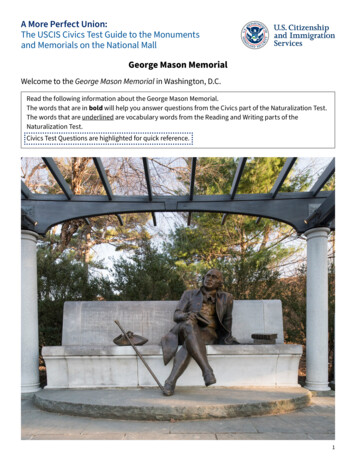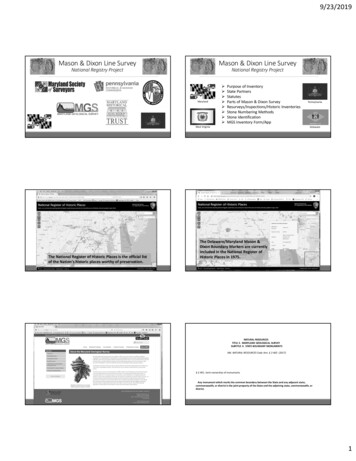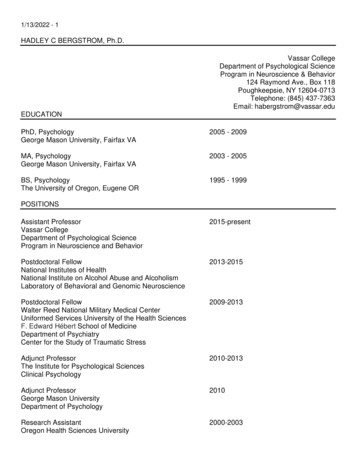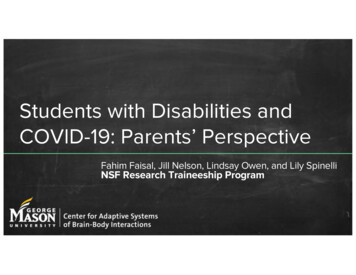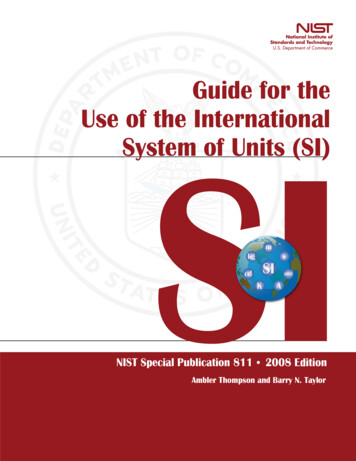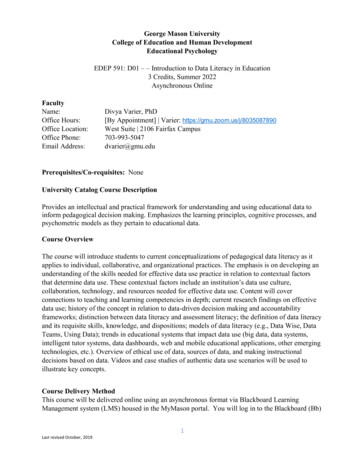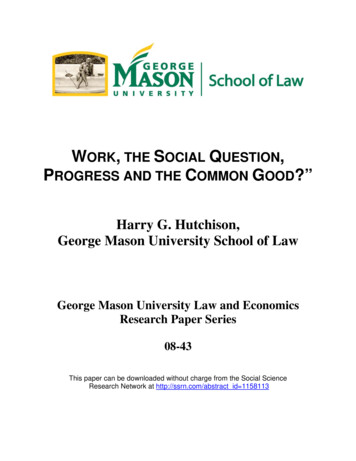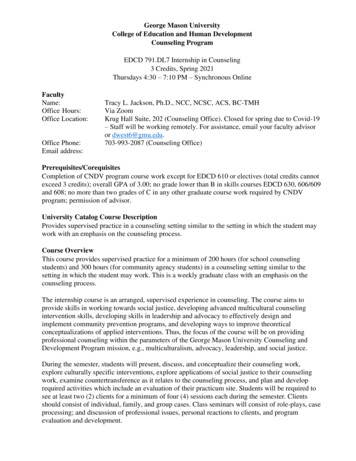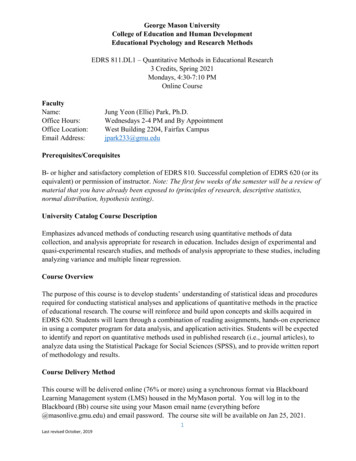
Transcription
George Mason UniversityCollege of Education and Human DevelopmentEducational Psychology and Research MethodsEDRS 811.DL1 – Quantitative Methods in Educational Research3 Credits, Spring 2021Mondays, 4:30-7:10 PMOnline CourseFacultyName:Office Hours:Office Location:Email Address:Jung Yeon (Ellie) Park, Ph.D.Wednesdays 2-4 PM and By AppointmentWest Building 2204, Fairfax Campusjpark233@gmu.eduPrerequisites/CorequisitesB- or higher and satisfactory completion of EDRS 810. Successful completion of EDRS 620 (or itsequivalent) or permission of instructor. Note: The first few weeks of the semester will be a review ofmaterial that you have already been exposed to (principles of research, descriptive statistics,normal distribution, hypothesis testing).University Catalog Course DescriptionEmphasizes advanced methods of conducting research using quantitative methods of datacollection, and analysis appropriate for research in education. Includes design of experimental andquasi-experimental research studies, and methods of analysis appropriate to these studies, includinganalyzing variance and multiple linear regression.Course OverviewThe purpose of this course is to develop students’ understanding of statistical ideas and proceduresrequired for conducting statistical analyses and applications of quantitative methods in the practiceof educational research. The course will reinforce and build upon concepts and skills acquired inEDRS 620. Students will learn through a combination of reading assignments, hands-on experiencein using a computer program for data analysis, and application activities. Students will be expectedto identify and report on quantitative methods used in published research (i.e., journal articles), toanalyze data using the Statistical Package for Social Sciences (SPSS), and to provide written reportof methodology and results.Course Delivery MethodThis course will be delivered online (76% or more) using a synchronous format via BlackboardLearning Management system (LMS) housed in the MyMason portal. You will log in to theBlackboard (Bb) course site using your Mason email name (everything before@masonlive.gmu.edu) and email password. The course site will be available on Jan 25, 2021.Last revised October, 20191
Under no circumstances, may candidates/students participate in online class sessions (eitherby phone or Internet) while operating motor vehicles. Further, as expected in a face-to-faceclass meeting, such online participation requires undivided attention to course content andcommunication.Technical RequirementsTo participate in this course, students will need to satisfy the following technical requirements: High-speed Internet access with standard up-to-date browsers. To get a list of Blackboard’ssupported browsers ing Started/Browser Support#supported-browsersTo get a list of supported operation systems on different devices ing Started/Browser Support#tested-devices-andoperating-systems Students must maintain consistent and reliable access to their GMU email and Blackboard,as these are the official methods of communication for this course.Students will need a headset microphone for use with the Blackboard Collaborate webconferencing tool.Students may be asked to create logins and passwords on supplemental websites and/or todownload trial software to their computer or tablet as part of course requirements.The following software plug-ins for PCs and Macs, respectively, are available for freedownload:o Adobe Acrobat Reader: https://get.adobe.com/reader/o Windows Media 4209/get-windows-media-playerApple Quick Time Player: www.apple.com/quicktime/download/Expectations Course Week:Our course week will begin on the day that our synchronous meetings take place asindicated on the Schedule of Classes.Log-in Frequency:Students must actively check the course Blackboard site and their GMU email forcommunications from the instructor, class discussions, and/or access to course materials atleast three times per week. In addition, students must log-in for all scheduled onlinesynchronous meetings.Participation:Students are expected to actively engage in all course activities throughout the semester,which includes viewing all course materials, completing course activities and assignments,and participating in course discussions and group interactions.Last revised October, 20192
Technical Competence:Students are expected to demonstrate competence in the use of all course technology.Students who are struggling with technical components of the course are expected to seekassistance from the instructor and/or College or University technical services.Technical Issues:Students should anticipate some technical difficulties during the semester and should,therefore, budget their time accordingly. Late work will not be accepted based on individualtechnical issues.Workload:Please be aware that this course is not self-paced. Students are expected to meet specificdeadlines and due dates listed in the Class Schedule section of this syllabus. It is thestudent’s responsibility to keep track of the weekly course schedule of topics, readings,activities and assignments due.Instructor Support:Students may schedule a one-on-one meeting to discuss course requirements, content orother course-related issues. Those unable to come to a Mason campus can meet with theinstructor via telephone or web conference. Students should email the instructor to schedulea one-on-one session, including their preferred meeting method and suggested dates/times.Netiquette:The course environment is a collaborative space. Experience shows that even an innocentremark typed in the online environment can be misconstrued. Students must always re-readtheir responses carefully before posting them, so as others do not consider them as personaloffenses. Be positive in your approach with others and diplomatic in selecting your words.Remember that you are not competing with classmates, but sharing information and learningfrom others. All faculty are similarly expected to be respectful in all communications.Accommodations:Online learners who require effective accommodations to insure accessibility must beregistered with George Mason University Disability Services.Learner Outcomes or ObjectivesThis course is designed to enable students to do the following:(1) Understand the logic of hypothesis testing, type 1 and 2 error, and statistical power;(2) Demonstrate a conceptual understanding of the following statistical techniques: one-way, twoway, and three-way ANOVA, part and partial correlation, ANCOVA, and simple and multipleregression;(3) Demonstrate via linear equation and explain each of the techniques listed above interms of the general linear model;(4) Select and justify an appropriate test statistic for a particular hypothesis;(5) Explain and examine underlying assumptions of each analysis as well as makerecommendations for analysis if the assumptions are not upheld;(6) Develop SPSS computer skills necessary for conducting statistical analyses;(7) Write-up reports of statistical analyses using correct APA format;(8) Read, understand, and interpret results of all analyses covered in the course.Last revised October, 20193
Professional StandardsNot ApplicableRequired Texts(1) Hahs-Vaughn, D., Lomax, R. (2020). An Introduction to Statistical Concepts (4th ed.). NewYork: Routledge, 8(2) Access to SPSS software. There are computer labs on campus that provide access to SPSS.You can access SPSS software through GMU’s virtual computer library athttps://its.gmu.edu/service/citrix-virtual-lab/. It is the student’s responsibility to ensure access toSPSS outside of class time as there will not be sufficient time in class to complete requiredassignments.(3) A simple nonprogrammable calculator that has a square root function.Course Performance EvaluationStudents are expected to submit all assignments on time in the manner outlined by the instructor(e.g., Blackboard, Tk20, hard copy). Assignments and/or Examinationso Online Quizzes (10%): There will be a short quiz posted on Blackboardimmediately on Mondays. The quizzes are composed of short answer and multiplechoice items which will cover the basic concepts presented in class and in thetextbook. These quizzes are designed to provide you (and me) with feedback aboutyour course progress. Your quiz score cannot lower your overall course grade (unlessyou have received 0’s on quizzes due to failure to complete them). You mustcomplete the online quiz by Sundays at midnight.o Homework Assignments (20%): You will have 6 homework assignments.Assignments will be posted on Mondays. All assignments need to be completed bySundays at midnight. No late assignments will be accepted. Some questions will askyou to explain statistical concepts, some will ask you to work out problems, andothers will require you to run analyses using SPSS and interpret results. You shouldshow all of your work for any problem that you complete and include appropriatecomputer printouts (please cut and paste from SPSS to Word). You may worktogether on your assignments; however, students should submit their ownindependent write-up of results.o Exams (40%): The two online exams will cover the material from the class andtextbook and include multiple choice and short answer questions as well asinterpretation of SPSS output. The midterm exam is worth 20% and the final exam isworth 20%.o Understanding Research Article Methods/Analysis (10% each -- 20%total):Students will complete two article summaries with a particular emphasis on theLast revised October, 20194
research questions, methods, analysis, and results. For the first article summary,students will respond to a series of questions using an article that has been selectedby the instructor. For the second article summary, each student may select fromoptions provided by the instructor or identify an empirical journal in the student’sarea of interest that includes the required statistical tests. Students will read the entirearticle, identify key components of the methods/analysis and write a shortcommentary/critique (3 pages maximum) of the Methods & Analysis section.Helpful hint: Pay attention to the methods and analyses sections of articles fromother courses or research projects. These are great candidates for this courserequirement.Other Requirementso Participation (10%): Students should ask their own questions or reply back to theinstructor’s comments, or share their thoughts on other students’ questions on BBDiscussion Board at least once every week.GradingGrades will be assigned based on the following:A 98-100%B 88-89%C70-79%A93-100%B83-87%Fbelow 70%A90-92%B80-82%Professional DispositionsSee lass ScheduleDate1/25Class1TopicReview of Scale of measurement Frequency distribution Central tendencyReading/Due Ch. 1 (1.3-1.5) Ch. 2 (2.1-2.5) Ch. 3 (3.2-3.4) Quiz (class 1 review) posted2/12 Ch. 2 (2.1-2.5) Ch. 3 (3.2-3.4) Quiz (class 2 review) posted2/83Review of Variability Graphical representation Introduction to SPSS Normal distribution Standard scores Standard error2/154 Hypothesis testing Power, effect size, confidence intervals2/225 T-tests (independent and dependent)3/16 Chi-square testsLast revised October, 20195 Ch. 4 (4.1-4.3) Ch. 5 (5.2) Quiz (class 3 review) posted Homework 1 posted Ch. 6 (all of 6) Quiz (class 4 review) posted Ch. 7 (all of 7) Quiz (class 5 review) posted Homework 2 posted Ch. 8 (8.2-8.3) Quiz (class 6 review) posted Article summary 1 posted (Due: 4/4)
3/83/153/22789 Review & midterm prepMidterm Exam One-factor ANOVA3/2910 Factorial ANOVA4/511 Correlation and Regression4/1212 Multiple Regression4/1913 ANCOVA Repeated measures4/265/31415 Review & final exam prepFinal Exam Homework 3 posted Ch. 11 (11.1, 11.4-11.5) Ch. 12 (12.1-12.2, 12.4) Quiz (class 9 review) posted Ch. 13 (13.1, 13.4, 13.6) Quiz (class 10 review) posted Homework 4 posted Ch. 10 (10.1-10.5) Ch. 17 (17.1-17.3, 17.5, 17.7) Quiz (class 11 review) posted Ch. 18 (18.1-18.3, 18.5,18.7) Quiz (class 12 review) posted Homework 5 posted Article summary 2 posted (Due: 5/4) Ch. 14 (14.1-14.2, 14.4, 14.6) Ch. 15 (15.4, 15.6, 15.10) Quiz (class 13 review) posted Homework 6 postedNote: Faculty reserves the right to alter the schedule as necessary, with notification to students.Core Values CommitmentThe College of Education and Human Development is committed to collaboration, ethicalleadership, innovation, research-based practice, and social justice. Students are expected to adhereto these principles: http://cehd.gmu.edu/values/.GMU Policies and Resources for StudentsPolicies Students must adhere to the guidelines of the Mason Honor Code stem/ ). Students must follow the university policy for Responsible Use of Computing onsible-use-of-computing/). Students are responsible for the content of university communications sent to their Masonemail account and are required to activate their account and check it regularly. Allcommunication from the university, college, school, and program will be sent to studentssolely through their Mason email account. Students with disabilities who seek accommodations in a course must be registered withGeorge Mason University Disability Services. Approved accommodations will begin at thetime the written letter from Disability Services is received by the instructor (seehttps://ds.gmu.edu/).Last revised October, 20196
Students must silence all sound emitting devices during class unless otherwise authorized bythe instructor.Campus Resources Support for submission of assignments to Tk20 should be directed to tk20help@gmu.edu orhttps://cehd.gmu.edu/aero/tk20. Questions or concerns regarding use of Blackboard shouldbe directed to ructional-technologysupport-for-students/. For information on student support resources on campus, esources-on-campusNotice of mandatory reporting of sexual assault, interpersonal violence, and stalking:As a faculty member, I am designated as a “Responsible Employee,” and must report all disclosuresof sexual assault, interpersonal violence, and stalking to Mason’s Title IX Coordinator perUniversity Policy 1202. If you wish to speak with someone confidentially, please contact one ofMason’s confidential resources, such as Student Support and Advocacy Center (SSAC) at 703-3801434 or Counseling and Psychological Services (CAPS) at 703-993-2380. You may also seekassistance from Mason’s Title IX Coordinator by calling 703-993-8730, oremailing titleix@gmu.edu.For additional information on the College of Education and Human Development, please visitour website https://cehd.gmu.edu/students/ .Last revised October, 20197
Last revised October, 20198
o Online Quizzes (10%): There will be a short quiz posted on Blackboard immediately on Mondays. The quizzes are composed of short answer and multiple-choice items which will cover the basic concepts presented in class and in the textbook. These quizzes are designed to provide you (and me) with feedback about your course progress.

